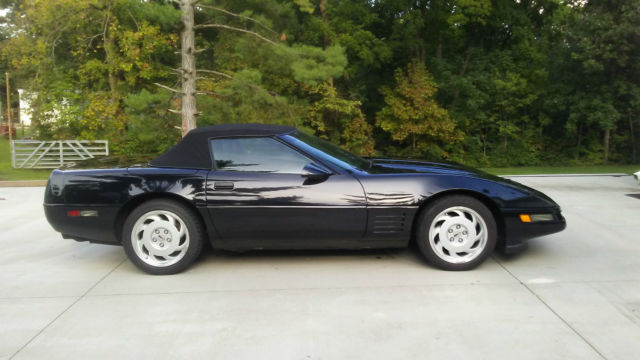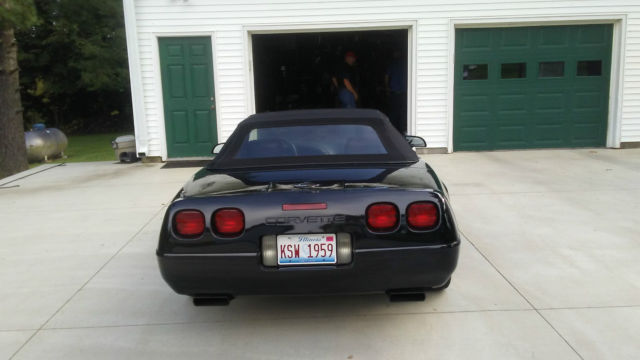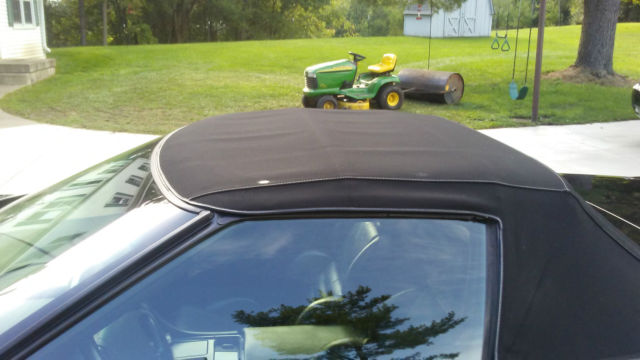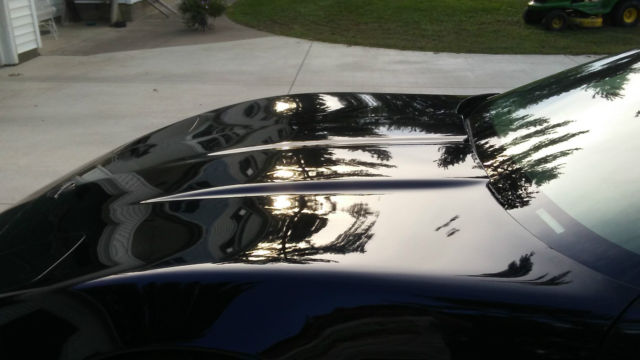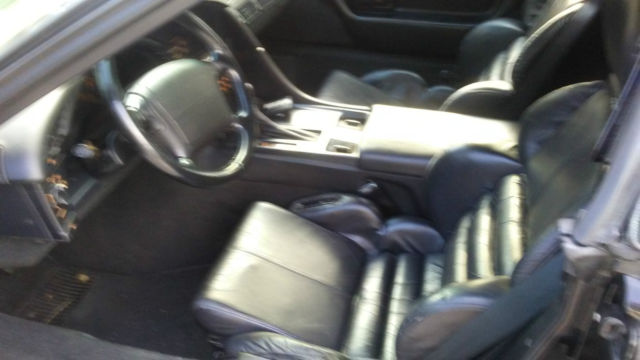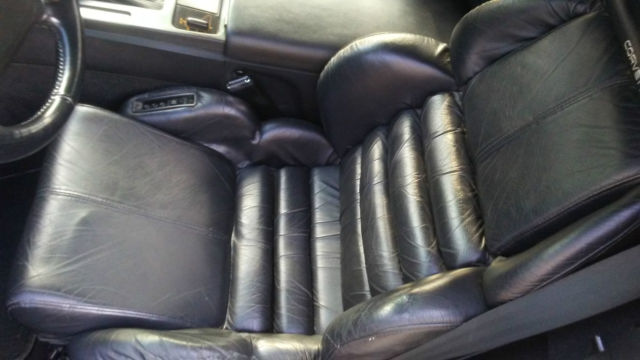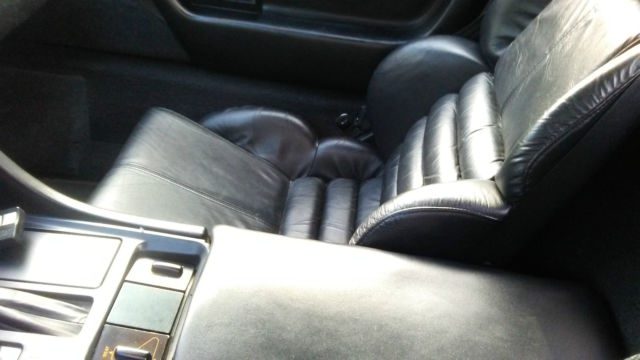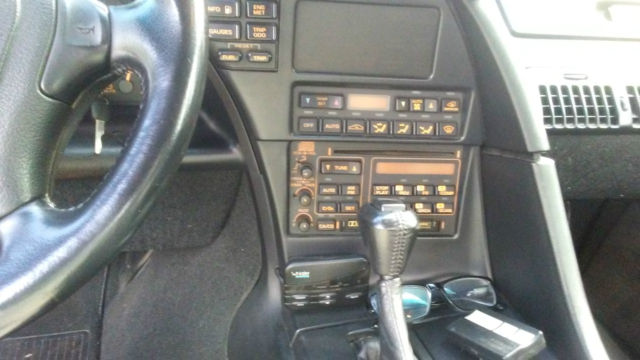VERY CLEAN BLACK 1992 CHEVROLET CORVETTE CONVERTIBLE
- Price:
- Location: Washington, Illinois, United States
- Make: Chevrolet
- Model: Corvette
- Type: Convertible
- Trim: COUPE 2-DOOR
- Year: 1992
- Mileage: 72,368
- VIN: 1g1yy33p2n5116499
- Color: Black
- Engine size: V-8 C-4 350 CUBIC IN 5.7 LITER
- Number of cylinders: 8
- Power options: Air Conditioning, Cruise Control, Power Locks, Power Windows, Power Seats
- Fuel: Gasoline
- Transmission: Automatic
- Drive type: RWD
- Interior color: Black
- Safety options: Anti-Lock Brakes, Driver Airbag
- Options: Cassette Player, CD Player, Convertible, Leather Seats
- Vehicle Title: Clear
1992 Chevrolet Corvette Description
VERY CLEAN CHEROLET CORVETTE 1992 CONVERTIBLE RAG TOP
- BLACK EXTERIOR
- BLACK INTERIOR
- LEATHER SEATS
- AUTOMATIC TRANSMISSION
- POWER WINDOWS, SEATS, AND DOOR LOCKS
- BOSE AM FM STERO WITH CD AND CASSETTE PLAYER
- A/C
- RADAR DETECTOR
- CONVERTIBLE RAG TOP Convertible: 46.4in (1,180mm) (1984–1992)
- WHEELBASE 96.2 IN (2,440 MM)
- ASSEMBLY BOWLING GREEN KY USA
- FRONT TIRES LESS THEN HALF WORN
- REAR TIRES LIKE NEW LITTLE TO NO WEAR
- ANTILOCK BRAKES
- DRIVER SIDE AIR BAG
EVERYTHING IS IN GOOD WORKING CONDITION. CAR HAS HAD REGULAR MAINTENANCES, DRIVEN MODERTLY WELL TAKEN CARE OF. NO TEARS IN THE LEATHER SEATS OR RAG TOP. OVER ALL PAINT IS IN GOOD CONDITION WITH MINOR SCRATCHES. MECHANICALLY SOUND WITH NO ISSUES THAT I AM AWARE OF. VERY CLEAN INTERIOR AND EXTERIOR.
I BELIEVE I AM THE SECOND OWNER, BUT I CAN NOT BE 100% SURE OF THIS.
ALL TRANSACTIONS WILL GO THROUGH PAYPAL FOR DOWN PAYMENT,CUSTOMER PICK UP NO SHIPPINGOFFERED.ONLY SERIOUS BUYERS PLEASE. I WILLSENDINVOICE AT CLOSE OF AUCTION DOWN PAYMENT IS EXPECTED WITHIN 24 HRS. IF YOU WOULD LIKE TO SCHEDULE VISUAL INSPECTIONPLEASE CONTACT ME PRIOR TO CLOSE OF AUCTION.
The C4 Corvette was known for its evolved, sleek and modern look. In a departure from the fiberglass panels of its forebearers, the C4's rear bumpers and panels were made from molding plastics, a sheet molding compound. The C4 coupe was the first general production Corvette to have a glass hatchback (the limited edition 1982 Collectors Edition being the first Corvette equipped with this feature) for better storage access. The Corvette C4 came standard with an electronic dashboard with a digital liquid crystal display dash, with graphics for speed and RPM and digital displays for other important engine functions.
The C4 represented a clean break from the previous generation of Corvette with a completely new chassis and modern, sleeker styling. Since emissions regulations were still changing and electronic engine management was in its infancy, horsepower was, compared to earlier generations, low. Therefore, the primary design emphasis, at least for the launch, was on handling and braking, with all-independent suspension with light-weight suspension and wheels, and all new brakes with aluminum calipers. The front suspension saw the C3's coil springs replaced by a transverse fiberglass mono-leaf spring, which was only 1/3 of the weight of the coil springs while also introducing an anti-roll bar-like effect on the front.[3] The price of this no-holds-barred emphasis on handling was ride comfort, especially with the Z51 performance and handling package. The C4 did not use separate body-on-frame construction like its predecessors. Instead, it used what GM termed a "uniframe", which consisted of a traditional perimeter frame, with the door posts, windshield frame, halo, and the rear portion of the floor pan integrated into one welded assembly. This was not a unibody assembly, as none of the exterior body panels were structural members. Due to a styling decision to use a targa top instead of T-tops, there was no structural member tying the windshield frame to the halo as on the C3. This required extremely tall side rails on the frame to maintain chassis rigidity, and as a result, the door sills were quite deep, with entry and exit likened by contemporary auto journals to a "fall in and climb out" experience. The targa top bolted into place, becoming a structural component, rather than simply latching on like T-tops. Despite the tall frame rails, the C4 was prone to rattles and squeaks, especially with the targa top removed. The emergency brake, located between the door sill and the drivers seat, was moved lower and toward the rear of the car in 1988 for easier entry and exit.From 1984 through 1988, the Corvette was available with a Doug Nash "4+3" transmission - a 4-speed manual coupled to an automatic overdrive on the top three gears. This unusual transmission was a synergy that allowed Corvette to keep a stout 4 speed, but add an overdrive. As technology progressed, it was replaced by a modern ZF 6-speed manual. However, the C4 performance was hampered by its L98 250hp (186kW) engine until 1992, when the second-generation Chevy small block, LT1, was introduced, markedly improving the C4s performance. 1996 was a high point of small block Chevrolet development and the 330hp (246kW) LT4 was introduced in all six-speed manual transmission cars. The LT4 achieved a 30hp gain over the LT1 and top the dyno scales at 330 hp at 5,800 rpm and 340 lb-ft of torque at 4,500 rpm. While the LT4 was available in any Corvette, it was highlighted in the '96 Grand Sport package.[4]
The 1986 Corvette saw the reintroduction of the convertible and was named as the Pace Car for the Indianapolis 500. 1986 also saw the introduction of the Pass Key I passive anti-theft system, wherein each key contained a special pellet that could be detected and identified by the car's computer system by detecting electrical resistance. Being early in the rollout of this new technology, there were only 15 different resistance values available, which, once thieves discovered this weakness, markedly reduced the value of this early system.
44 Corvettes were manufactured with a 1983 Vehicle Identification Number (VIN), but none were released to the public as official production vehicles. All were destroyed except one, VIN 1G1AY0783D5100023 (white with medium blue interior), L83 350cuin (5.7L), 205hp (153kW) V8, 4-speed automatic transmission and was retired to the National Corvette Museum in Bowling Green, Kentucky. (MY1984 Corvettes were produced for 17 months.)
On Aug-30-16 at 13:07:56 PDT, seller added the following information: 1992 Chevrolet Corvette Base Convertible 2-Door 5.7L V8 (Black on Black)
1992 Chevrolet Corvette Base Convertible 2-Door 5.7L V8 (Black on Black)
Mileage: 83,400
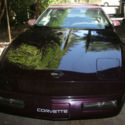 Chevrolet Corvette Black Rose 1992 Gray Leather Seat Clean Low Mi. Eclipse Coupe
Chevrolet Corvette Black Rose 1992 Gray Leather Seat Clean Low Mi. Eclipse Coupe
Mileage: 57,352
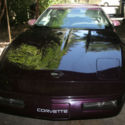 Chevrolet Corvette Black Rose 1992 Coupe Gray Leather Seats Clean Low Milage Gas
Chevrolet Corvette Black Rose 1992 Coupe Gray Leather Seats Clean Low Milage Gas
Mileage: 57,352
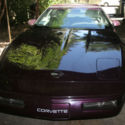 Chevrolet Corvette Black Rose 1992 Coupe Gray Leather Seats Clean Low Mileage
Chevrolet Corvette Black Rose 1992 Coupe Gray Leather Seats Clean Low Mileage
Mileage: 57,352
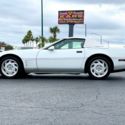 1992 CHEVROLET CORVETTE, AUTOMATIC , CONVERTIBLE,GARAGE KEPT, VERY CLEAN CAR
1992 CHEVROLET CORVETTE, AUTOMATIC , CONVERTIBLE,GARAGE KEPT, VERY CLEAN CAR
Mileage: 40032
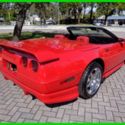 1992 Chevrolet Corvette Convertible 23,734 Orig Low Miles Clean Fax No Reserve
1992 Chevrolet Corvette Convertible 23,734 Orig Low Miles Clean Fax No Reserve
Mileage: 23,734
 1992 Chevrolet Corvette Convertible- Factory Purple (Black Rose)
1992 Chevrolet Corvette Convertible- Factory Purple (Black Rose)
Mileage: 57,400
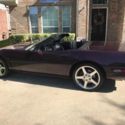 1992 Chevrolet Corvette Convertible, Black Rose color, 45K miles, Show Quality
1992 Chevrolet Corvette Convertible, Black Rose color, 45K miles, Show Quality
Mileage: 45,200
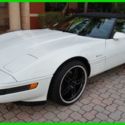 1992 1993 1991 1994 Chevrolet Corvette Convertible White Black 6 speed LOOK!
1992 1993 1991 1994 Chevrolet Corvette Convertible White Black 6 speed LOOK!
Mileage: 95,490
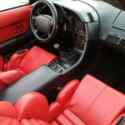 1992 Chevrolet Corvette Convertible 6 speed White Red Black 1993 1994 1991 C4
1992 Chevrolet Corvette Convertible 6 speed White Red Black 1993 1994 1991 C4
Mileage: 95,450
